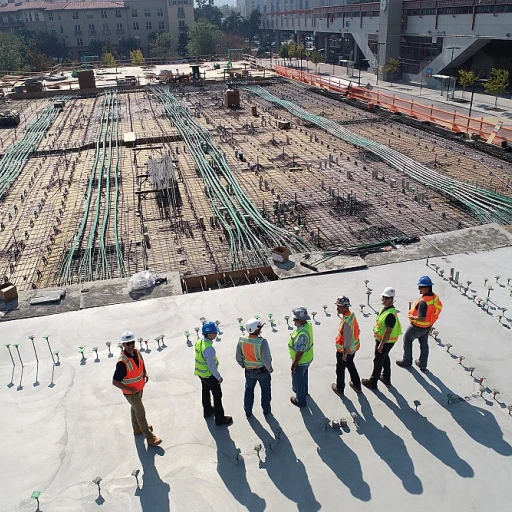
The Role of AI in Modern Background Checks
The Interplay of AI and Employment Background Checks
In the realm of employment screening, artificial intelligence has carved out a significant role for itself, revolutionizing the way background checks are carried out and interpreted. The implementation of AI in such processes not only provides a more efficient way to conduct background checks but also ensures greater accuracy and compliance with federal and state regulations. AI-driven systems streamline the pre-employment background check process by swiftly analyzing vast amounts of data and identifying relevant patterns in criminal history, employment history, and other critical areas. This capability allows employers to make well-informed hiring decisions with speed and assurance. For instance, when a candidate's records are screened for adverse actions, AI can comprehensively evaluate the potential risks against the organization's compliance policy, giving employers an edge in identifying suitable candidates. Moreover, the utilization of AI in background checks offers a more unbiased approach by minimizing human errors and subjective biases that might influence hiring decisions. With traditional methods, inconsistencies and manual errors can often taint the integrity of background screening. However, AI automates these processes to reduce such pitfalls, ensuring that checks are thorough and factual. The fusion of AI into employment screening reflects a significant shift from past practices where checks were predominantly manual and time-consuming. The advent of faster background check technologies powered by AI allows employers to conduct these checks with more precision and speed. This not only enhances the hiring process but also sets new benchmarks for how employee background verification is performed across various industries. To delve further into how AI is transforming human resources, including employment screenings, you can explore more about rethinking HR and its progressive integration with advanced technologies. AI's contribution to reshaping background screening will likely continue to evolve, presenting both promising benefits and navigating challenges that lie ahead in this transformative era.Benefits of AI-Powered Background Checks
Advantages of Automated Screening Processes
Utilizing AI in employment background checks offers a range of benefits that significantly streamline the hiring process for employers. These are not just confined to reducing the time it takes to complete background screenings, but also in enhancing the accuracy and compliance of the checks. One of the primary advantages lies in the speed of processing when conducting background checks. AI algorithms have the capability to swiftly analyze large volumes of data, thereby facilitating faster background screening. This means that checks employers make can be completed in a fraction of the time it would take manually, leading to a more efficient hiring process. Additionally, AI-driven checks increase the accuracy of employment screening. Traditional methods of background check often involve manual data entry, which can be prone to errors and inconsistency. AI minimizes this risk by automating the collection and verification of data, ensuring that the background check form is filled accurately. This reduces the likelihood of errors in reports related to criminal history or employment records. Another critical benefit is the compliance with relevant legal frameworks, such as state local and federal state regulations. AI systems can be programmed to adhere to all applicable laws, including those that govern adverse action and privacy concerns in employee background checks. Compliance becomes streamlined, as the AI can consistently apply the same standards across all candidates, minimizing the risk of legal challenges. Furthermore, AI can provide a more comprehensive view of a candidate’s history. By harnessing AI, employers can be assured that pre-employment verification is thorough, examining factors that include criminal records, employment background, and job history. Check this resource for further insights into differentiating factors in AI-driven processes. AI-powered employment screening brings an unmatched level of efficiency and accuracy to the hiring world. By automating manual tasks, reducing errors, and ensuring legal compliance, AI fundamentally transforms how employers conduct background checks.Challenges and Ethical Considerations
Ethical Considerations of AI in Background Screening
As employers increasingly integrate AI into the background screening process, it is paramount to address the ethical dimensions that accompany these technological advancements. While AI offers efficiency and accuracy, it also necessitates careful scrutiny regarding privacy, bias, and compliance.
Firstly, privacy concerns are a major consideration with AI-driven background checks. The vast amounts of data processed during these checks, including criminal records, employment history, and other personal details, require strict adherence to data protection regulations. Employers must ensure that their screening processes remain compliant with federal, state, and local laws governing data privacy.
Moreover, bias in AI systems is a significant ethical challenge. While AI algorithms are designed to be objective, they can inadvertently perpetuate biases present in historical data. This can lead to unfair discrimination against certain candidates based on past employment records or criminal history. Companies must continually audit and refine their AI systems to mitigate biases and promote equity in the hiring process.
Additionally, the automation of conducting background checks raises issues related to transparency and informed consent. Candidates should be adequately informed about the nature of the checks to be conducted, and the scope of AI's role in the process. This transparency is crucial to maintaining trust between employers and potential employees and to ensuring that the process respects the rights of candidates.
Lastly, while AI streamlines the verification of employment and faster background reports, there is the ethical consideration of "adverse action". Employers must be cautious in how they use AI-generated reports to make hiring decisions. It is essential to provide candidates with the opportunity to contest or explain findings in their background check.
In conclusion, while AI-powered background checks enhance the hiring process by making it more efficient, ethical considerations must not be overlooked. Companies should strive to balance technological innovation with ethical responsibility, ensuring their policies are comprehensive and align with an ethical framework that respects individual rights and promotes fairness.
Comparing Traditional vs. AI-Driven Background Checks
Traditional Methods vs. Innovative AI Solutions
The realm of employment background checks is increasingly being shaped by the advent of artificial intelligence. Comparatively, traditional methods often rely on manual processes, such as contacting past employers and conducting reference checks. These methods can be time-consuming, prone to human error, and may even delay the hiring process. In contrast, AI-driven background checks offer a more streamlined approach. This technology automates the employment background screening process, significantly reducing the time it takes to gather and analyze data. AI utilizes algorithms to sift through vast amounts of information, such as criminal history, employment records, and educational verification, ensuring that employers have a comprehensive view of a candidate’s history before making hiring decisions. Another aspect where AI excels is in compliance with federal, state, and local regulations. AI systems can be programmed to stay updated with the latest compliance requirements, helping employers avoid potential legal pitfalls. This is particularly important when conducting pre-employment criminal background checks, where non-compliance can lead to adverse actions. Furthermore, AI introduced in employment screening mitigates biases associated with human judgment. For instance, manual checks often involve subjective assessments that can unwittingly lead to discrimination. AI provides an objective form of assessment, conducting background checks based solely on data-driven insights. However, it's crucial to ensure that AI systems themselves are free of inherent biases, a consideration that needs addressing during the AI development phase. Thus, while traditional checks still hold value, particularly for their personal touch, AI solutions provide a faster, more reliable, and legally compliant method for employers seeking to conduct thorough background screening. The shift toward AI-driven checks is not only about efficiency but also about ensuring fairness and accuracy in the hiring process.Case Studies: AI in Action
Real-World Applications of AI in Employment Background Checks
AI technology is revolutionizing employment screening processes, providing employers with tools to streamline background checks and enhance hiring decisions. Let's explore some case studies that demonstrate AI in action within this context. These instances showcase how AI is reshaping the landscape of background verification.
- Accelerated Candidate Screening: A prominent tech company implemented an AI-driven background check form that reduced screening time significantly. Previously, the employer faced delays due to manual verification methods and long response times from third parties. With AI, criminal history checks could be conducted within hours instead of days, allowing for faster background screening.
- Enhanced Criminal Record Detection: Financial institutions are adopting AI-powered solutions to improve their employee background screening procedures. Using advanced algorithms, these systems ensure exhaustive checks into criminal background records, flagging potential concerns that may have been overlooked through traditional methods.
- Compliance and Policy Adherence: In industries where compliance with federal state and local regulations is critical, AI systems are proving indispensable. By automating the check process, organizations ensure adherence to employment standards and policies, maintaining a robust framework when conducting background verification.
- Addressing Adverse Action: In a sensitive case, an engineering firm faced challenges when a candidate flagged for potential adverse action due to inaccuracies in their background check report. AI technology not only facilitated accurate re-evaluation but also ensured the organization's compliance with pre-employment regulatory requirements without breaching candidate privacy.
These examples highlight AI’s capacity to streamline background checks, improve accuracy, and ensure a smoother hiring process. By integrating AI, employers can make informed, timely decisions while maintaining high standards for compliance and ethical hiring practices.
Future Trends in AI and Background Checks
Emerging Trends in AI and Background Screening Processes
The integration of artificial intelligence in the realm of background checks is continuously evolving, offering new insights into how technology can enhance the employment screening process. The landscape is shifting significantly, and it's worthwhile to examine emerging trends that could shape the future of this industry.One significant trend is the growing use of AI in refining employment background verification. AI is being leveraged to automate and streamline the documentation checks, reducing the time it takes to get reliable background reports for job candidates. This encompasses various elements of a candidate's history, such as employment records, educational verification, and more detailed criminal history inquiries.
Moreover, as technology advances, the accuracy of AI in identifying discrepancies in background records is improving. This aspect is particularly helpful in criminal background checks where compliance with federal and state regulations is stringent. Additionally, AI's capability to analyze vast amounts of data contributes to identifying potential adverse actions more efficiently, thus assisting employers in making informed hiring decisions.
Another trend gaining traction is the emphasis on faster background screening without compromising the thoroughness of the check. AI-driven processes are increasingly preferred by employers due to their ability to conduct background checks quickly, which is crucial in today's fast-paced hiring landscape.
A trend to keep an eye on is the evolution of AI algorithms that not only verify candidate records but also project potential risks associated with new hires. This development might eventually play a pivotal role in shaping hiring policies and forming strategic hiring processes.
Lastly, as the use of AI in employment screening becomes more widespread, there will be an increasing demand for compliance and adherence to ethical considerations. Employers, therefore, need to stay informed about legal standards and the establishment of checks and balances to maintain fair and transparent hiring practices.
The future of AI in employment screening looks promising, with more innovative applications on the horizon that promise to enhance the overall hiring process for both employers and candidates. The continuous improvement and adoption of AI-centric methods will likely define how background checks are conducted moving forward, emphasizing compliance and efficiency in the screening form.













